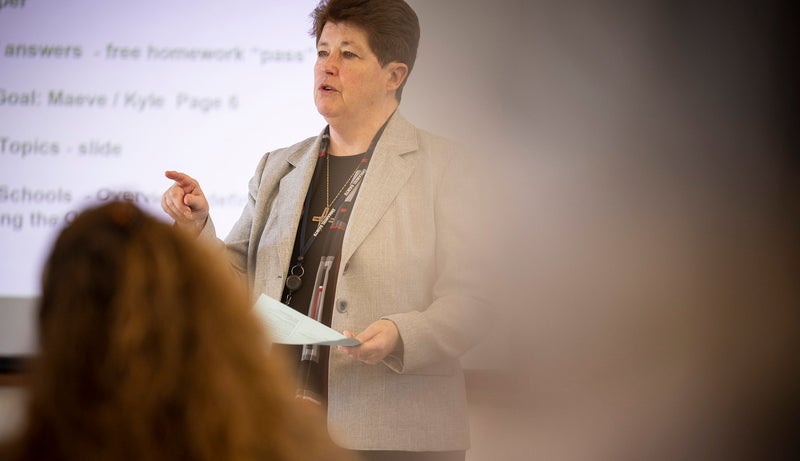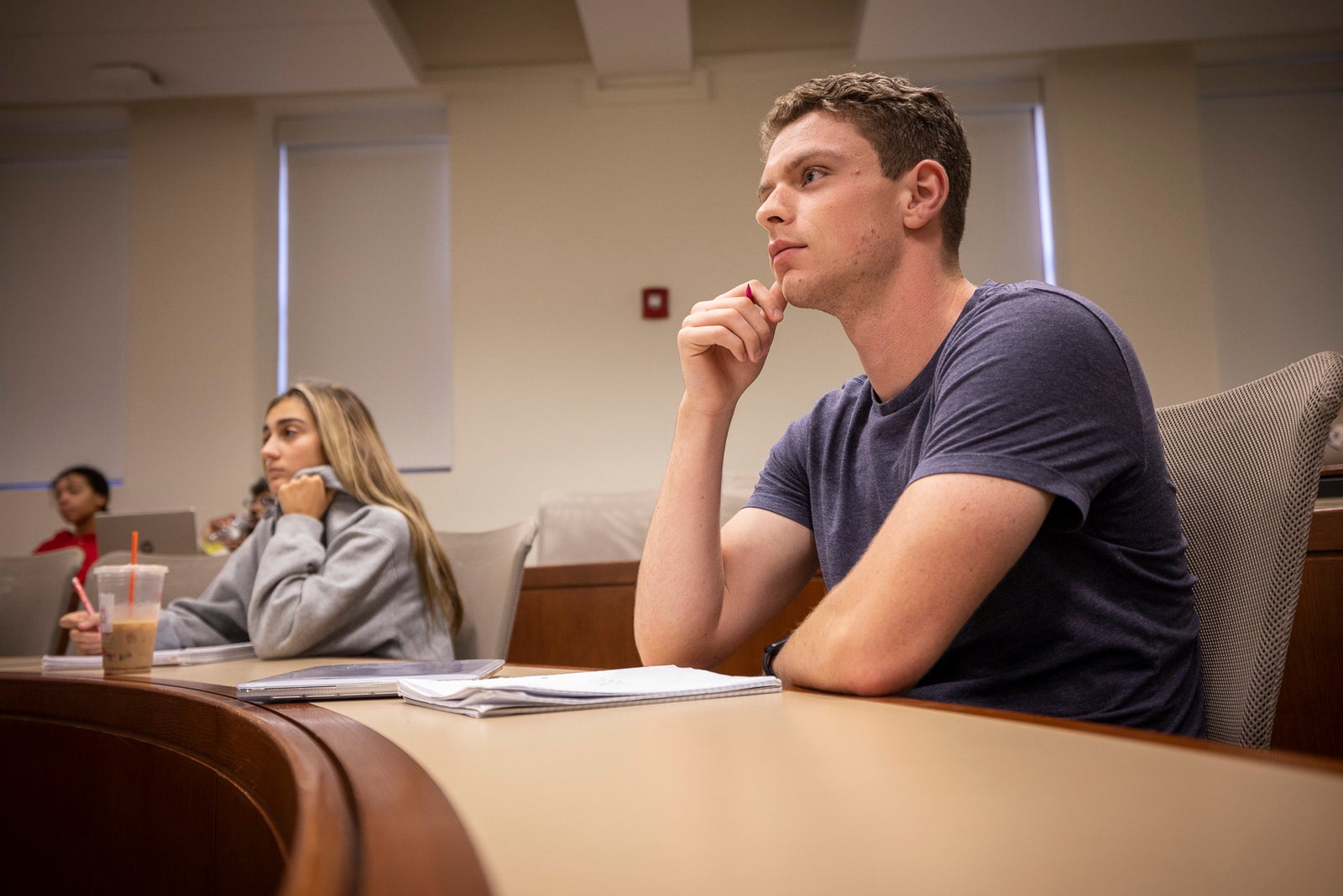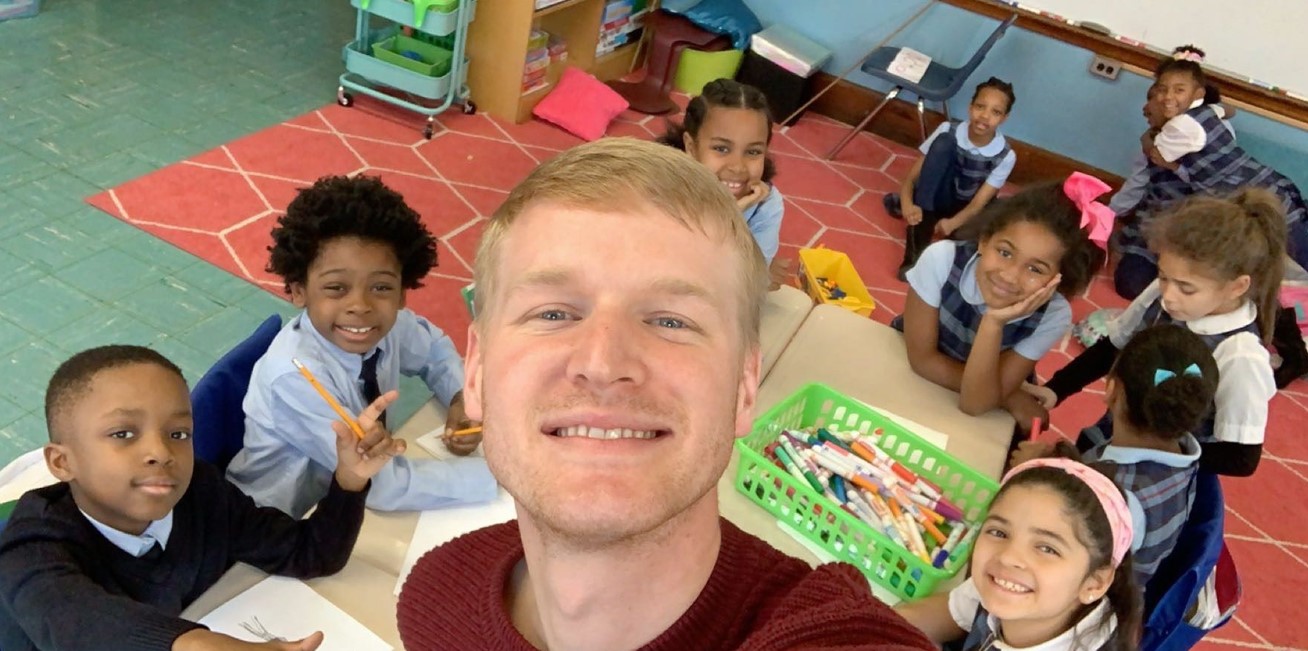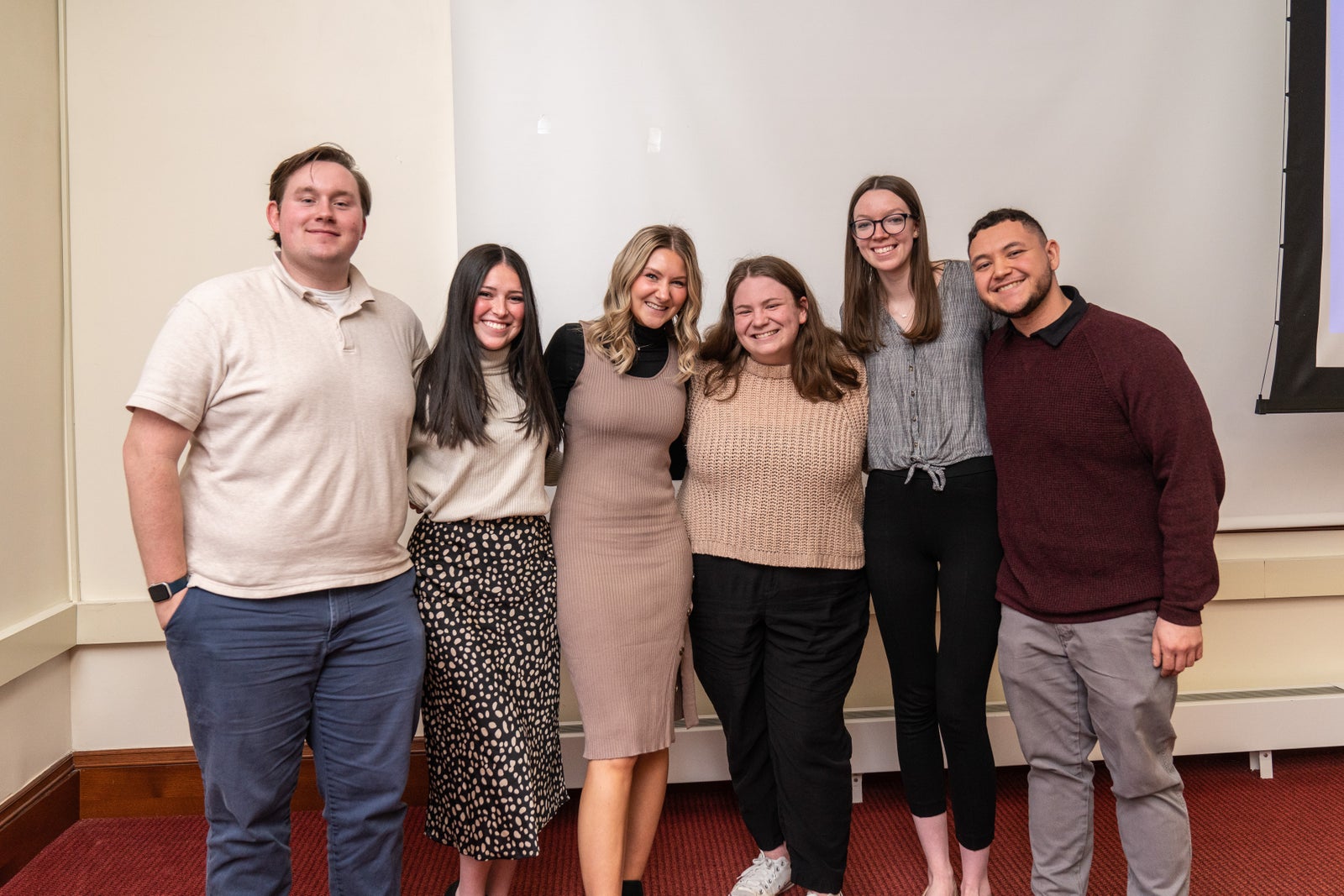Teach Where Futures Take Form
Tomorrow’s doctors, entrepreneurs, engineers and artists are in today’s classrooms, and the right teacher can change the trajectory of a student’s life. As a secondary education major at Emmanuel, you’ll study instructional strategies, adolescent development, and inclusive classroom practices while gaining real-world experience in Boston’s diverse schools. You’ll complete fieldwork and student teaching in settings aligned with your subject area, developing the confidence, creativity and compassion to lead a classroom and ignite a lifelong love of learning.
Student Satisfaction, by the Numbers
100%
100%
100%
100%
A Best-in-Class Experience
Get to know the people and programs that will define your academic journey.

Gabrielle Wenc ’22, G’23 Heads Back to Argentina with Fulbright
After earning two education degrees and years of teaching experience, Gabrielle will return to Argentina—this time as a Fulbright English Teaching Assistant.

Meet the Faculty
Our distinguished faculty publish, exhibit and research. Present, compose and chair. Inspire and collaborate.
The Curriculum
View the 2024-2025 Academic Catalog to find course titles, numbers and descriptions.
Students interested in Secondary Teacher Licensure (grades 5-8, 8-12 or 5-12) complete a major in a discipline of study and a second major in secondary education. Subject area majors leading to teacher licensure at the secondary level are: art, biology, chemistry, English literature, history, mathematics and Spanish.
Four-Year Sequence for Secondary Education
First Year
- EDUC1111 The Great American Experiment (SA) (SS) (SJ)
- PSYCH2403 Adolescent Development (SA) (SS)
Second Year
- EDUC2311 Learning, Teaching and the Secondary Curriculum
- EDUC2312 Teaching All Students, Grades 5-12*
Third Year
- EDUC3311 Managing the Classroom Learning Environment*
- EDUC3300 Sheltered English Instruction: Teaching English Language Learners**
English Majors:
- EDUC3318 English Language Arts Instructional Methods Grades 5-12
History Majors:
- EDUC3315 History and Social Science Methods: Grades 5-12
Mathematics Majors:
- EDUC3313 Mathematics for Middle School/High School
Modern Language Majors:
- EDUC4178 Modern Language Curriculum
Science Majors:
- EDUC3314 Explorations in Science & Engineering: Grades 5-12
Fourth Year
- EDUC4467 Student Teaching Practicum
- EDUC4468 Student Teaching Capstone Seminar
* Includes pre-practicum field-based experience
** May enroll junior year
The program of study in elementary and secondary education is designed to develop students' abilities in the seven performance areas required for initial licensure in elementary and secondary teaching in the state of Massachusetts. Upon completion of the elementary or secondary education programs at Emmanuel, students will be able to:
- Create safe and well-managed learning environments which promote equity and collaboration among heterogeneous learners and nurture development across the cognitive, emotional and social domains.
- Plan learning experiences which involve learners as sense-makers and promote deep understanding of disciplinary ideas by engaging learners in active exploration of real-world problems, materials, and challenges, and examining student work products to make assessments of learning and teaching.
- Utilize a broad range of instructional practices, reflective of the ways of knowing in the disciplines they teach, to ensure that all learners regardless of differences in readiness, background, learning style, culture, or language competency have opportunities to learn through access to a rich curriculum.
- Forge positive relationships with families and engage in regular, two-way, culturally proficient communication with families about students and their learning, and build into the curriculum materials the richness of the cultures and heritage of the students they teach.
- Develop curricula which deepens learners' appreciation for American civic culture, its underlying ideals, founding principles and political institutions and which actualizes learners' capacities to participate and lead in their communities, both locally and globally.
- Advance issues of social justice within the classroom, school and community.
- Contribute to the knowledge base about learning, teaching and assessment and participate in a culture of reflective practice and inquiry.
What can I do with a degree in secondary education?
A degree in secondary education typically prepares graduates to become teachers in middle school or high school. With a degree in secondary education, you can pursue careers such as:
- Teacher: You can become a middle school or high school teacher in subjects such as English, math, science, history, or foreign language.
- Curriculum Specialist: You can work with school districts to develop curriculum and lesson plans that align with state and national standards.
- Instructional Coordinator: You can work with teachers to improve classroom instruction and develop training programs for professional development.
- Education Administrator: With additional training or education, you can pursue careers in school administration, such as principal or assistant principal.
- Education Researcher: You can work for educational research organizations to design and conduct studies to improve education policies and practices.
- Educational Consultant: You can provide consulting services to schools and education organizations to improve educational practices, policies, and outcomes.
- Education Policy Analyst: You can work for government agencies, think tanks, or advocacy organizations to analyze education policies and propose improvements.
- Corporate Trainer: You can work for companies to develop and deliver training programs for employees on various subjects.
These are just a few examples of the many careers that are available with a degree in secondary education.
Secondary education majors obtain a variety of skills, including:
- Classroom management: They learn how to create a positive and productive learning environment, manage student behavior, and promote cooperation and respect.
- Curriculum development: They learn how to design and implement lesson plans that are age-appropriate and engaging, and align with state standards.
- Instructional strategies: They learn how to use various instructional methods and technologies to teach a diverse group of students with different learning styles.
- Assessment and evaluation: They learn how to assess student progress, provide feedback, and use data to improve teaching and learning.
- Communication and collaboration: They learn how to communicate effectively with students, parents, and colleagues, and work collaboratively to support student learning and achievement.
- Cultural competence: They learn how to create inclusive learning environments that respect and value the diversity of all students and their families.
- Adaptability and flexibility: They learn how to adapt to changes in the curriculum, school policies, and student needs, and be flexible in their teaching strategies to meet individual student needs.
- Passion for teaching: They develop a strong passion for teaching and helping students achieve their full potential, and a commitment to lifelong learning and professional growth.
Where Essential Values and Skills Meet the Real World
Along with areas of knowledge and major requirements, you will cultivate essential values in the classroom and complete two courses in each area:
- Social Justice (SJ): Develop knowledge, skills, values and motivation to participate beneficially in activities of personal and public concern.
- Diversity & Multiculturalism (DM): Understand the complexity of identity the historical truths of different cultural perspectives to address bias and examine contemporary social issues.

One hundred percent of Emmanuel students complete an internship or practicum as part of the core curriculum. In a city as dynamic as Boston, your options are bound only by the limits of your curiosity.
Students from the School of Education complete their student teaching at many sites in Boston, including Boston Latin School, Cathedral High School, Eliot Innovation School, Fenway High School, OLPH Mission Grammar School, Richard J. Murphy School, and the Maurice Tobin School.

In all majors, the Capstone Experience involves completing a significant piece of work that requires the integration and application of learning from multiple courses.
The student teaching practicum and capstone seminar in the final year of study are the culminating experience for students completing majors in education. The experience integrates supervised student teaching with a seminar that requires active reflection on instructional practice. Students complete a portfolio to demonstrate their achievement of the learning goals of the Education major.

Education Spotlight
See more news and stories related to the School of Education


